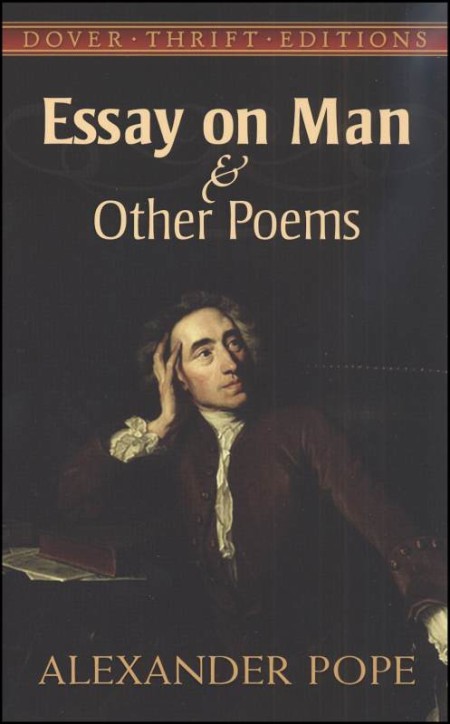I wrote the core of following piece in March of 2001 for the Stonybrook University class, EGL 310 – Neoclassical Literature, later added to it, then originally published it to my MySpace blog…
When studying an author’s writing, a reader is sometimes presented with the opportunity to better understand and appreciate one particular work by considering it in direct relation to another. In holding two points of reference, one can fluidly journey with a writer through some of life’s more complex and far-reaching topics, while still thoroughly exploring them to conclusion, and in regard to one another. Alexander Pope’s two writings, Essay on Man: Epistle I and Essay on Man: Epistle II, being complimentary works, are worthy of such comparison.
Both Epistle I and Epistle II are laced with the themes of passion and reason. Using them as a basis, Pope is able to describe some of the many complex characteristics of the personality and behavior of human beings. Reading both works together is the best way to gain a fully-enriched understanding of the implications surrounding these two themes and just how intricately they are related to each other.
Pope believes that our amount of reason not only separates us, as human beings, from any other animal on earth, but that it also gives us our power over them. According to Epistle I, “…Throughout the…world, an universal order and gradation in the sensual and mental faculties is observed which cause the subordination of creature, and of all creatures to Man. The graduations of sense, instinct, thought, reflection, reason; that Reason alone countervails all other faculties” (VII, 122). Aware that this is a powerful gift, Pope does not believe, however, that human beings are the sole carriers of reason. He notes the fact that non-reasoning inorganic and organic matter, as well organisms, still follow an overall reason-based balance with each other in their environment. He also doesn’t exclude the possibility that reason might have been given to human beings directly by another force, with direct access to reason, as well. For proof, Pope observes that our natural environment makes sense even when it is unaware of this fact for itself. According to Epistle I, “of Systems possible, if ’tis confest…that all that rises, rise in due degree; then, in the scale of reas’ning life, ’tis plain there must be, somewhere, such a rank as Man” (43-48, 123).
Pope views pride as the reason why human beings tend to believe that they are so unique and special. He suggests that there is a correlation between reason and pride in the mind of the human being. In Epistle I, Pope states, “In Pride, reas’ning Pride, our error lies” (123, 125). He sees pride as an error and feels that reason is the cause of our pride. Using the trait of reason, one could very easily conclude that he is special, and in turn, develop pride. Pope feels that pride can limit the human capacity, causing individuals to ignore facts and possibilities simply because they make the recipient feel less important or special.
However, in Epistle I, Pope also states, “from pride, from pride, our very reas’ning springs” (126). With this, the relationship between reason and pride becomes a bit more complex. How exactly does pride lead to reason? The answer to this question comes from Epistle II. According to Pope, “two Principles in human nature reign; Self-love, to urge, and Reason, to restrain” (53-54, 132). On the surface, this might appear to be a completely new equation. However, it is actually a variation on the one that Pope presented in Epistle I, since pride is, in fact, a form of “self-love.” With this understanding, the formula begins to fall into place. The urges produced by pride and self-love cause the restraints of reason to kick in. Therefore, the mind of the human being can be considered a sort of scale. Reason balances our pride and self-love, and pride and self-love balance our reason.
In both Epistle I and Epistle II, Pope ascertains that reason is a form of thought. Self-love and pride, while generating from thought, are only fully realized when put into action. According to Pope’s equation, it is not the thought, but the physical urges produced by self-love and pride that cause their complex relationship with reason. In order to understand the true nature of their relationship, we must discover what those “urges” are. Reading Epistle II carefully will again reveal the answer. Pope states that the “modes of Self-love the Passions we may call” (93, 133). Passions are the acts assisting pride and self-love with their expression. Passions and reason are the roots of Pope’s complex human equation. Passions cause reason, and then reason causes passions. He reveals this final connection between them when he states, “what Reason weaves, by Passion is undone” (42, 132), which can be juxtaposed with his earlier position, “from pride, from pride, our very reas’ning springs.” Human beings begin with their passions, find reason, then finally, use reason to find their passions. Both reason and passion have a less-evolved form and a more-evolved form. At any given time, moment or situation, individuals are working along at some stage in this process, whether they grow, stagnate, continue to grow, or continue to stagnate.
Understanding Pope’s complex human equation can only take place by reading both Epistle I and Epistle II, and once this is done, re-reading each Epistle with his formula in mind actually brings forth further enlightenment. For example, the following sentence from Epistle I now makes a great deal more sense. “Why charge we Heav’n in those, in these acquit? In both, to reason right is to submit. Better for Us, perhaps, it might appear, Were there all harmony, all virtue here; That never air or ocean felt the wind; that never passion discompos’d the mind: But ALL subsists by elemental strife; and Passions are the elements of Life’ (163-170, 127). While Pope feels the human mind is in a constant state of disharmony, he also understands that, as he said in Epistle II,”the two Principles of Man, Self-love (Passion) and Reason [are] both necessary” (130). No person could choose one over the other. They both contribute to the personality of an Individual. To lose passions for the sake of reason would cause that human being to lose flavor for life. To lose reason for the sake of passion would cause human being to lose control over life. And, since no one knows what stage in the human equation of “passions-to-reason-to-passion-in-reason” each individual truly is, drawing any definitive conclusions about another person’s character based on their actions is pointless.
Pope illustrates the fact that the human individual is a complex being, led by usually opposing forces, and because of this, “he hangs between; in doubt to act, or rest, In doubt to deem himself a God, or Beast; In doubt his Mind or Body to prefer, Born but to die, and reas’ning but to err: Alike in ignorance, his reason such, Whether he thinks too little, or too much: Chaos of Thought and Passion, all confus’d; Still by himself abus’d, or disabus’d; Created half to rise, and half to fall; Great lord of all things, yet a prey to all” (5-16, 131). Pope feels that man has the powers of both a “God” and an animal, which causes a conflict within him. Should he act like a “God,” although he is not omnipotent and all knowing? Or, alternatively, should he act like an animal, although his body and natural instincts are weak?
Pope’s answer is to forget about trying to live up to the standards of others, and to stop worrying about selling one’s self short. “We can judge only with regard to our own system, being ignorant of the relations of systems and things…[human beings should be] suited to [their] place and rank in the creation, agreeable to the general Order of things, and comfortable to Ends and Relations to him unknown” (I-II, 121). Basically, Pope suggests that one should judge his own existence according to his own life. Each person knows his or her particular strengths, weaknesses and potential. Individuals should not let the lives of others affect their quality of life and happiness. Individuals should also refrain from allowing their self-pride to stifle them on the path towards gaining an ever-increasing knowledge, wisdom, and understanding of life, and of the other individuals that make it up. Also, Pope stresses the concept that every other creature has some sort of symbiotic relationship with nature – a relationship that nature and humans haven’t shared in a long time. Nature is technically part of our system, so instead of wasting valuable time by constantly fulfilling our need to create new technologies and gadgets, human beings should wind down a bit to appreciate the natural surroundings and elements that were put there specifically for our comfort.
Alexander Pope’s works, Essay on Man: Epistle I and Essay on Man: Epistle II are two beautifully complimentary works, meant to be read together. While each one of these essays individually holds great merit, by studying them in juxtaposition, readers are presented with the opportunity to much more thoroughly explore the very vast and complex topics of passion and reason.
(All original portions of this work, by Rayn Kleipe, are licensed under a Creative Commons Attribution-NonCommercial-ShareAlike 4.0 International License, while all redistributed links, images, sounds, videos, and writings are protected under 17 U.S.C. § 107: Fair Use, or under Public Domain)










